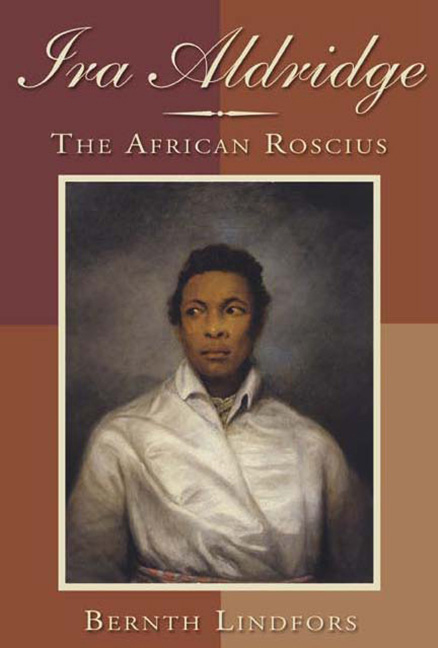Book contents
- Frontmatter
- Miscellaneous Frontmatter
- Contents
- List of Illustrations
- Acknowledgments
- Introduction
- Part One: The Life
- Part Two: The Career
- 8 Ira Aldridge's Fight for Equality
- 9 Ira Aldridge in Manchester
- 10 Acting Black: Othello, Othello Burlesques, and the Performance of Blackness
- 11 Ira Aldridge: Shakespeare and Minstrelsy
- 12 “Mislike me not for my complexion … “: Ira Aldridge in Whiteface
- 13 Ira Aldridge as Macbeth and King Lear
- 14 Creating the Black Hero: Ira Aldridge's The Black Doctor
- 15 The First American on the Zagreb Stage
- 16 A Heartwarming, Radiant Othello in the Netherlands, 1855
- 17 Ira Aldridge's Performances in Meiningen
- 18 “Othello's Occupation's Gone!” The African Roscius in Poland, 1853–67
- Notes on Contributors
- Index
- Miscellaneous Endmatter
11 - Ira Aldridge: Shakespeare and Minstrelsy
from Part Two: The Career
Published online by Cambridge University Press: 26 October 2017
- Frontmatter
- Miscellaneous Frontmatter
- Contents
- List of Illustrations
- Acknowledgments
- Introduction
- Part One: The Life
- Part Two: The Career
- 8 Ira Aldridge's Fight for Equality
- 9 Ira Aldridge in Manchester
- 10 Acting Black: Othello, Othello Burlesques, and the Performance of Blackness
- 11 Ira Aldridge: Shakespeare and Minstrelsy
- 12 “Mislike me not for my complexion … “: Ira Aldridge in Whiteface
- 13 Ira Aldridge as Macbeth and King Lear
- 14 Creating the Black Hero: Ira Aldridge's The Black Doctor
- 15 The First American on the Zagreb Stage
- 16 A Heartwarming, Radiant Othello in the Netherlands, 1855
- 17 Ira Aldridge's Performances in Meiningen
- 18 “Othello's Occupation's Gone!” The African Roscius in Poland, 1853–67
- Notes on Contributors
- Index
- Miscellaneous Endmatter
Summary
Ira Aldridge (1807–67) was one of the first actors of African descent to appear on British and other European stages, and he was the first to achieve widespread fame and recognition. Born in New York, Aldridge began his theatrical career there before emigrating to England in about 1825. Although he is little known currently in the United States, he was a celebrated Shakespearean, most notably in the roles of Othello, Macbeth, Shylock, and Lear. His success brought him into contact with a diverse collection of personages that included the British tragedian Edmund Kean, the German naturalist Baron von Humboldt, “the Swedish Nightingale” Jenny Lind, Alexandre Dumas (père), Hans Christian Andersen, probably Franz Liszt, and possibly Richard Wagner (an Aldridge admirer). His two daughters, Luranah and Amanda, also earned considerable renown in Europe as classically trained singers and, in Amanda's case, as a composer who also gave voice lessons to the likes of Roland Hayes, Marian Anderson, and Paul Robeson.
The single substantial work of Aldridge scholarship in English is Herbert Marshall and Mildred Stock's biography, Ira Aldridge: The Negro Tragedian (1958), which includes a wealth of primary reference materials.2 According to Marshall and Stock's research, Aldridge was born in New York City on July 24, 1807. Son of Luranah Aldridge and Daniel Aldridge, a lay preacher and street vendor of straw, Ira attended one of New York's African Free Schools in his teens. There he received a formal education rare for African Americans at the time: “boys were taught reading, writing, arithmetic, English grammar, composition, geography, astronomy,” and other subjects.3 His amateur and semiprofessional experience in drama began with the African (or African Grove) Theatre, which existed from about 1820 to 1823, where he may have played Shakespeare's Romeo and Rolla in Richard Brinsley Sheridan's adaptation of Pizarro.
The African Theatre was the scene of an important episode that affected Aldridge's career from its inception to its end. This episode underscored the fact that Aldridge's performances encompassed not only Shakespeare but also blackface minstrelsy and various points in between.
Act 1: Hamlet in Blackface?
In Love and Theft: Blackface Minstrelsy and the American Working Class, Eric Lott briefly discusses the British actor Charles Mathews (1776–1835), a precursor of the United States minstrels of the 1830s onward. Mathews's “American caricatures included black preachers and other such types—the first popular antecedents of blackface acts.”
- Type
- Chapter
- Information
- Ira AldridgeThe African Roscius, pp. 157 - 179Publisher: Boydell & BrewerPrint publication year: 2007

